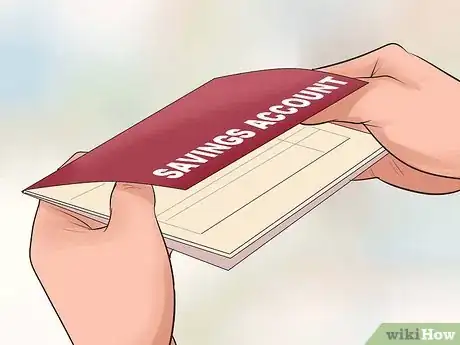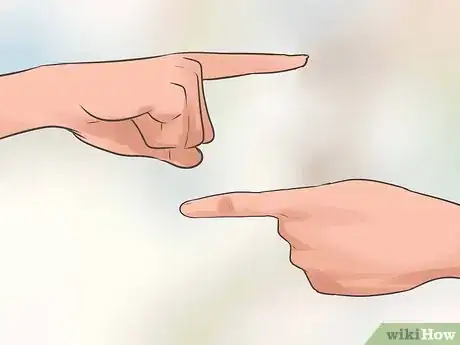This article was co-authored by Michelle Shahbazyan, MS, MA. Michelle Shahbazyan is the Founder of The LA Life Coach, a concierge life, family, and career coaching service based in Los Angeles, California. She has over 10 years of experience with life coaching, consulting, motivational speaking, and matchmaking. She has a BA in Applied Psychology and an MS in Building Construction and Technology Management from Georgia Tech University, and a MA in Psychology with an emphasis on Marriage and Family Therapy from Phillips Graduate University.
There are 12 references cited in this article, which can be found at the bottom of the page.
This article has been viewed 311,357 times.
It can be difficult to make the transition from childhood or adolescence to becoming a capable adult. Everyone has a different version of what it means to be an adult, but there are some common goals to achieve in order to function as an independent person and make your way through life on your own merit, without the help of parents or guardians.
Steps
Living an Adult Lifestyle
-
1Complete your education. At the very least, earn a high school diploma or GED. If you can, however, consider going for a college Associates or Bachelors degree. This will improve your chances at landing a well-paying job that you enjoy. Afterwards, you can even go back to college and earn a Masters or PhD degree. This will improve your chances of landing that job.[1]
- Find something you love to stick with in school, and this will likely give you a purpose in your adult life.
-
2Get a job. Diligently search online job hunting sites, newspaper classifieds, or get to know people in your field that might have job opportunities for you to start earning a paycheck. Once you have a job, get to work on time every day, do your work consistently, and find opportunities to learn; this will show your worth as a responsible employee.[2]
- Submit quality cover letters and resumes that show your education and experience when applying to jobs.
- Don’t forget to ask questions in job interviews, and research the company ahead of time.[3]
Advertisement -
3Become financially independent. Get a job with a consistent and large enough paycheck to cover all of your expenses, and don’t rely on parents or others to provide for your bills, spending money, or other finances.
- You may have to cut back on a few luxuries at first, such as going out every Saturday night, until you earn a higher wage.
- Learn how to budget your expenses. This will help make you more financially independent.
-
4Get health, vehicle, and renters/homeowners insurance. When you’re of age, research and choose an insurance company for your health insurance and start paying premiums. If you have or plan to get a car, house, or apartment, you need insurance to cover those things, too.
- Insurance is important because it will help keep costs down in the case of emergencies.
- In some instances, you may not be able to own a car or rent an apartment without insurance.
-
5Find an apartment/house of your own. Find an apartment or house to rent or buy by searching online, in newspaper classifieds, or at an apartment finder service. You should find something that charges reasonable rent and that’s in a condition and area that makes you feel safe and healthy. Ideally, choose something that is close to work and other activities, and that you can afford to live in without roommates.
- Keep in mind that you often get what you pay for. If something is cheap, make sure that it's not a scam and that the surrounding area is safe.
-
6Have reliable transportation. Depending on what town or city you live in, buy a vehicle or find public transportation routes that you can easily use. You can find less expensive used cars at used car dealers, online, or in newspaper classifieds. You can often buy bus, train, or subway passes for less when you buy them for frequent use over long periods of time.
- If you plan on taking public transportation to work, check with your employer so see if they cover monthly passes; some employers offer that as a benefit.
-
7Travel the country or world. Save money and plan to travel to new places in order to experience new things, people, and ways of life.
-
8Seek committed relationships. Focus on committing to both friendships and romantic relationships that you see as lasting, with people that are also mature, responsible, and kind to you. Don’t waste time on flings or with people you know won’t last, and cut out anyone that brings out the worst in you.
- Keep in mind that not all relationships will work out. If a relationship starts to turn toxic, cut it off; don't let it drag on.
-
9Take responsibility for your actions. Recognize that everything you do has a consequence, and you are in control of the outcome of your life through your own words and actions. See that both good and bad actions, and their outcomes, are your choice.
- For example, if you want to get into a great college or university, you have to do well in school.
- Alternatively, if you talked back to that former boss of yours, you won't be able to use him/her as a reference for a job you really want.
Acquiring Responsible Habits
-
1Be on time to everything. Be somewhere if you say you will be, and show up on time; a basic sign of responsibility and respect.
-
2Use money wisely. Make budgets for your weekly spending on coffee, shopping, groceries, etc., and stick to it. Set a certain fixed amount or percentage of your paycheck that will go directly into a savings account that you don’t spend from.[4]
- You can also put money into a retirement fund, or invest it in the stock market with the help of an investor or a phone app.[5]
-
3Pay off bills, debts, and loans regularly. Set up auto-payments, email or text alerts, or other methods to easily pay or remind yourself to make payments on time, on a consistent basis. Pay your full credit card or loan balance if you can to avoid incurring interest and fees.[6]
- If you don't want to use an auto-payment system, then make it a habit to check your outstanding balances each week or month, and pay them off then.
-
4Organize your possessions. Store and organize things in your apartment or home in a logical way that will make being on time, put-together, and responsible much easier. Buy simple storage bins or closet organizers to reduce clutter and make things easy to find.[7]
- Put the following on hangers: coats, dresses, nice pants and skirts, button-down shirts, and nice blouses.
- Fold the following into drawers: jeans, T-shirts, underwear, socks, and sweaters.
Changing Your Mindset
-
1Let go of childish behavior you still have. Recognize if you have these common tendencies and work on changing them through simple intention, mental exercises, or therapy:[8]
- Sulking, whining, or complaining,
- Manipulating others to get sympathy
- Continually seeking direction from others
- Acting in a disorganized or irresponsible way
- Procrastinating, carelessness, and frequently being late
- Driving recklessly, or acting without regard to yours or others’ health and safety.
-
2Make independent decisions. Make choices in your life, whether they’re about colleges, jobs, relationships, or goals, because they are important to you and make you happy, not because your parents, friends, or other people tell you that you should.
- When you're first starting out on your own, it can feel strange to make decisions on your own without anyone holding your hand. However, keep in mind that every problem has a solution, and if you break the issue down step-by-step, you can find that solution.[9]
- It is perfectly fine to ask other people for advice. In the end, however, you should be the one making the decision. For example, you can ask your friends which doctor they recommend, but in the end, you should choose your doctor—not your friends.
-
3Like the things you like. It may sound obvious, but just own up to the things you genuinely enjoy and that make you happy. If you like a band that most people you know would deem corny or outdated, don’t make excuses or say that you like them in an ironic, joking way; just enjoy them.[10]
- Don't force yourself to like something just because everyone else likes it. If you hate a certain popular band, then you don't have to listen to them.
-
4Respect authority figures, without needing their constant approval. Let go of any tendency to rebel against or defy those older than you or in a superior position. Listen respectfully to those above you, and know that just because you’re an adult doesn’t mean you don’t have to listen to others. On the other hand, don’t do everything you do just to seek approval of superiors in your school, work, or social life.
- For example, if your boss tells you a report is due, complete the report on time. Don’t seek your boss's approval until after every section of the report is complete.
-
5Seek out constructive criticism. First, listen carefully to everything the person has to say about you or your performance. Then, decide which parts of their feedback you agree or disagree with, and what could be helpful to you. Finally, respond to them with mature and genuine questions, concerns, and thanks.[11]
- Remember to take criticism with a grain of salt. If you feel that something might actually make things worse, then don't do it.
-
6Develop goals and stick to them. Make goals that are both readily attainable (such as “Make a new friend this week” or “Go somewhere you’ve never been”) and more long-term (such as “Become a chef in a 5-star restaurant” or “Save enough money for a house”). Write your goals down to keep them in your mind, and reward yourself every time you attain one.
- It's okay to adjust your goals. If you realize that your goal may not be realistic, then modify it so that it is.
- Use goals for self-improvement and to break bad habits or addictions.
- Think about where you want to be when you retire. It might seem like a long way off, but by focusing on your long-term plans, you can make sure each step brings you closer to that goal.[12]
-
7Don’t blame others for your mistakes; own them. When something goes wrong, avoid blaming other people or circumstances for the problem. Instead, follow this process to recognizing your mistakes without shame and using them to create better circumstances:
- Acknowledge when you’ve made a mistake
- Do whatever is possible to correct it
- Think of how you can prevent it from happening again
- Come up with a mantra or a phrase to repeat in your head to avoid shame, such as, “It’s over and it won’t happen again.”[13]
Expert Q&A
-
QuestionHow do you handle problems in life?
 Michelle Shahbazyan, MS, MAMichelle Shahbazyan is the Founder of The LA Life Coach, a concierge life, family, and career coaching service based in Los Angeles, California. She has over 10 years of experience with life coaching, consulting, motivational speaking, and matchmaking. She has a BA in Applied Psychology and an MS in Building Construction and Technology Management from Georgia Tech University, and a MA in Psychology with an emphasis on Marriage and Family Therapy from Phillips Graduate University.
Michelle Shahbazyan, MS, MAMichelle Shahbazyan is the Founder of The LA Life Coach, a concierge life, family, and career coaching service based in Los Angeles, California. She has over 10 years of experience with life coaching, consulting, motivational speaking, and matchmaking. She has a BA in Applied Psychology and an MS in Building Construction and Technology Management from Georgia Tech University, and a MA in Psychology with an emphasis on Marriage and Family Therapy from Phillips Graduate University.
Life Coach Talk to other adults to find out how they handled similar problems and get advice. You can also get tips from people online. Don't feel like you have to solve all of your problems by yourself.
Talk to other adults to find out how they handled similar problems and get advice. You can also get tips from people online. Don't feel like you have to solve all of your problems by yourself. -
QuestionI just graduated college. How can I adjust to becoming an adult?
 Michelle Shahbazyan, MS, MAMichelle Shahbazyan is the Founder of The LA Life Coach, a concierge life, family, and career coaching service based in Los Angeles, California. She has over 10 years of experience with life coaching, consulting, motivational speaking, and matchmaking. She has a BA in Applied Psychology and an MS in Building Construction and Technology Management from Georgia Tech University, and a MA in Psychology with an emphasis on Marriage and Family Therapy from Phillips Graduate University.
Michelle Shahbazyan, MS, MAMichelle Shahbazyan is the Founder of The LA Life Coach, a concierge life, family, and career coaching service based in Los Angeles, California. She has over 10 years of experience with life coaching, consulting, motivational speaking, and matchmaking. She has a BA in Applied Psychology and an MS in Building Construction and Technology Management from Georgia Tech University, and a MA in Psychology with an emphasis on Marriage and Family Therapy from Phillips Graduate University.
Life Coach When you graduate college, you're suddenly flooded with a lot of new responsibilities, and that can feel stressful. However, keep in mind that you have the tools you need in order to succeed. It's just a matter of going out there and finding it.
When you graduate college, you're suddenly flooded with a lot of new responsibilities, and that can feel stressful. However, keep in mind that you have the tools you need in order to succeed. It's just a matter of going out there and finding it.
Warnings
- Don’t try to rush the process of growing up! Nearly every older person you talk to will say that their youth was the best part of their life and they wished they appreciated it more at the time.⧼thumbs_response⧽
References
- ↑ https://open.maricopa.edu/devpsych/chapter/chapter-8-emerging-adulthood/
- ↑ https://www.insidehighered.com/news/2022/05/19/young-adults-today-are-slower-gain-financial-independence
- ↑ https://www.prospects.ac.uk/careers-advice/interview-tips/7-good-questions-to-ask-at-an-interview
- ↑ https://youth.gov/youth-topics/financial-capability-literacy/facts
- ↑ https://www.dol.gov/sites/dolgov/files/ebsa/about-ebsa/our-activities/resource-center/publications/top-10-ways-to-prepare-for-retirement.pdf
- ↑ https://www.usafrancefinancials.com/resource-center/money/money-matters-why-it-pays-to-be-financially-responsible
- ↑ https://dictionary.cambridge.org/us/dictionary/english/organized
- ↑ https://www.psychologytoday.com/blog/the-human-experience/201308/how-become-more-adult-and-successful-in-your-life
- ↑ [ v161309_b02]. 22 April 2020.
- ↑ https://www.psychologytoday.com/us/blog/the-squeaky-wheel/201503/the-7-habits-truly-genuine-people
- ↑ https://www.psychologytoday.com/blog/the-human-experience/201308/how-become-more-adult-and-successful-in-your-life
- ↑ Michelle Shahbazyan, MS, MA. Life Coach. Expert Interview. 22 April 2020.
- ↑ https://hbr.org/2011/05/enjoy-the-fun-of-failure-at-le
- ↑ Michelle Shahbazyan, MS, MA. Life Coach. Expert Interview. 22 April 2020.
About This Article
Although it might seem hard to become an adult, you can ease the transition by practicing essential skills, like time and money management, while you’re still at home. To manage time well, always try to be punctual when meeting friends and family, as this shows respect for their time. If you’re running late, message people so they aren’t left wondering what’s happened to you. To become skilled at managing your money well, start by learning to budget. You can make this easier by downloading a budget app onto your smartphone and inputting all your expenses and bill payments, to keep track of your spending and savings. Once you’re confident with your budgeting and time skills, work toward gradually becoming independent from your family by setting goals like getting work. For more tips, including how to take responsibility for your own decisions, read on!


















































































